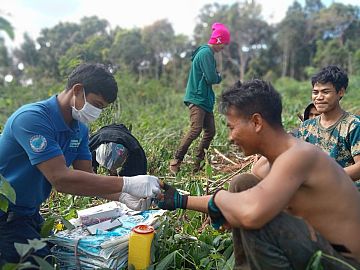New report outlines community-led approaches as critical in confronting last mile challenges in malaria elimination
20 March 2023 A mobile malaria worker gives a community member a malaria rapid diagnostic test
A mobile malaria worker gives a community member a malaria rapid diagnostic testEarlier this month, the Asia-Pacific Malaria Elimination Network (APMEN), together with Malaria Consortium and the Asia-Pacific Leaders Malaria Alliance (APLMA), published a report promoting the use of community engagement tools and approaches for vector control in countries across the Asia-Pacific, including Cambodia, Myanmar and Bangladesh.
The Asia-Pacific region has seen a decline in recent decades in the burden of many vector-borne diseases, particularly malaria and lymphatic filariasis. Engaging local communities in improving responses to vector control, especially where these communities are in remote locations, remains especially important. Community engagement approaches enable communities to drive interventions that focus on a public health issue and promote healthy behaviours, allowing for localised ownership of control and elimination efforts.
The report explores the rationale and approaches for community engagement in addition to practical examples from projects across Asia. These include community health workers providing a link between the community and public health system for rural communities in Odisha, India; a five-step approach to engage the community with a mass drug administration (MDA) programme in Laos; and an innovative approach in Cambodia designed to raise awareness of malaria among rural populations through activities such as village concerts.
The report also outlines priority areas to ensure meaningful community participation and engagement that promotes empowerment and equitable, context-specific solutions that can improve vector borne disease control and further drive towards elimination.
APLMA Executive Vice President of Advocacy and Programmes, Amita Chebbi, commented: “The adaptability of community engagement approaches is increasingly important, as challenges such climate change can impact the vulnerability of health among at risk populations. The work being done in rural areas and in places with limited access to health services can inspire public health action across the Asia Pacific region, empowering communities to drive and maintain change, particularly as we move closer towards reaching our goal of malaria elimination by 2030”.
The rationale behind using these approaches is four-fold. Community engagement approaches can be adapted to diseases, specific needs and contexts including political, social and climatic circumstances. Strategies can be designed to remove barriers to accessing services such as language, disability and gender. CHWs and volunteers can bridge gaps in service delivery for those hardest-to-reach or at risk and engaging communities in vector control and management initiatives may also prove more cost effective compared to a system-based service delivery model.
In Cambodia, initiatives like the Regional Artemisinin Initiative 3 Elimination (RAI3E), led by Malaria Consortium, are also striving to accelerate efforts to eliminate malaria by training local volunteers to provide free, point-of-care malaria testing and treatment services to mobile and migrant populations living along the country’s borders with Thailand, Laos and Vietnam, where the burden of P. falciparum malaria is highest.
Dr Leo Braack, Senior Vector Control Specialist from Malaria Consortium and Co-Chair of APMEN’s Vector Control Working Group (VCWG), added: “Rural communities bear the brunt of malaria mortality and morbidity wherever malaria occurs globally, and so it is critically important that these communities should be intimately involved in local measures to reduce malaria burden. For vector control, this usually means promoting effective use of insecticide-treated bednets, but with increasing outdoor-biting and early-evening biting by vector mosquitoes, community awareness of these increased risks and appropriate behavioural responses become very important. Malaria Consortium is supporting trials for use of spatial and topical repellents among especially forest workers in Cambodia to counter this outdoor and early-evening bitings”.
Webinars hosted by the VCWG about community engagement are available via its website (www.orene.org – the Online Resource Exchange Network for Entomologists) including Sustaining malaria responses beyond elimination: Mobilising domestic resources and planning for continuity and Community participation: A foundation for malaria elimination
Information is also available related to community engagement and dengue and malaria
Related content
20 July 2022
Photo story: Eliminating malaria in Cambodia
1 January 2021Regional Artemisinin Initiative 3 Elimination (RAI3E)
24 February 2021Expanding mobile malaria services to hard-to-reach communities in northern Cambodia
Latest news
- Malaria Consortium honoured by Ugandan government for contribution to combat malaria23rd April 2024
- International summit calls for AMR accountability in public health interventions21st March 2024
- Global SMC community celebrates new milestone at SMC Alliance Annual Meeting in Nigeria6th March 2024
- Scaling up key interventions could halve pneumonia-related childhood mortality13th February 2024
- Malaria Consortium and eGov Foundation join Mozambique’s national malaria programme to digitalise seasonal malaria chemoprevention campaigns8th February 2024
- World’s first malaria vaccine rollout launched in Cameroon22nd January 2024